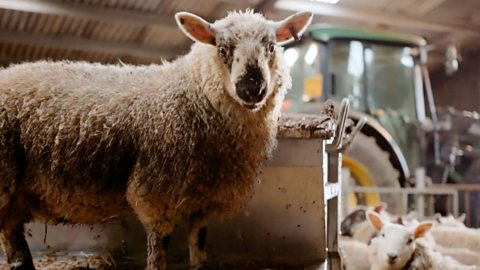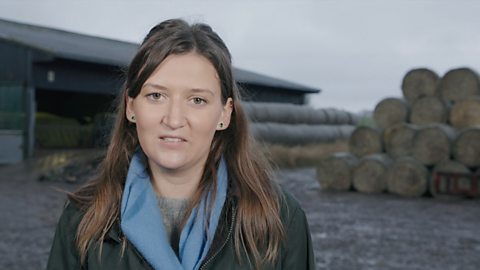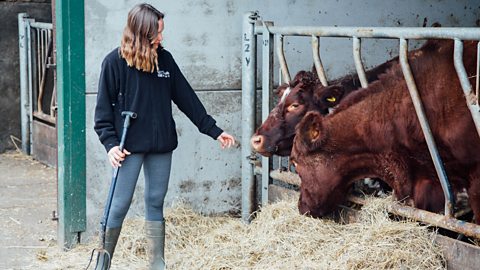Meet Aimee, 21, from the Shetland Islands in Scotland, to find out more about life as a farmer. Part of our Bitesize world of work series.
Aimee:
I'm Aimee. I'm 21 years old and I'm a farmer. Farming is a really unpredictable profession, because you're really dependent on the weather so you might get a bad year. Farming on the Shetland Islands is very difficult. We have high transport costs being on the island and there's bad weather so we get high winds and a lot of rain. Despite all of that, it's amazing farming on the Shetland Islands. It's such a beautiful island and there's a real strong community feel if you're ever needing help, then you know you can just phone up your neighbours and they're always there for you.
At school, I studied Maths, which has helped me on the farm by understanding accounts and I also studied Biology, which has helped me to know the background of how plants grow. There's a lot more to farming than just working outdoors. There's a lot of background information that goes on from researching, to doing the accounts and a lot of planning.
Aimee's sister:
We do most things side by side, together. Aimee went away for three years to college and in that time, then I was home on the farm, trying my best to run it alongside my mum and my grandad. So now that she's home, then she's come back with a lot of knowledge and skills that she's learnt while she was away, but I'm trying to teach of what we've been doing on the farm for the last few years.
Aimee:
Despite running the farm in Shetland and studying in Aberdeen. I also worked on a farm in Aberdeenshire, which was tricky, but with good organisation of my time and with the support of my family back in Shetland and it was all possible to do everything that I love. I came from a farm at such a young age. After our dad died four years ago, then there was a big decision to be made, whether we are going to carry on with the farm or not, but me and my sister were determined to make it work and carry on our family tradition. I'm really proud to be running the farm and continuing the family legacy, especially the good work that my dad did.
Young people should definitely get involved in agriculture.
- Aimee runs a farm with her sister - they look after cows and sheep and produce beef and lamb
- Aimee juggles farming with studying and recently completed a degree in Agriculture
- She uses Maths to keep track of the farm's accounts - for example, how much beef they sell each month
- Her farm is very big and runs across 300 hectares. One hectare is the size of an international rugby pitch or Trafalgar Square in London!

What to expect if you want to be a farmer
- Farmer average salary: ÂŁ21,000 to ÂŁ50,000 per year
- Farmer typical working hours: 39 to 41 hours per week
What qualifications do you need to be a farmer?
You could get into this role via a university course, a college course (such as a Level 2 certificate, a Level 3 Diploma, or a T-level in Agriculture, Land Management and Production - England-only, from Sept 2023), an apprenticeship, or by working towards the role by working as a supervisor, unit manager or assistant manager, and then moving into farm management.
Sources: LMI for All, National Careers Service, .
This information is a guide and is constantly changing. Please check the for the latest information and all the qualifications needed and the for more on T-levels.
Find out more on the Prospects website about the role of a .
For careers advice in all parts of the UK visit: , , and .


Find work experience placements with Workfinder.
Tips and advice
Help with interviews, writing a CV and all things work experience related.


Careers in agriculture collection
Find out what you could expect from careers in agriculture

Jenny: farming union policy manager. video
Jenny works as a policy manager for the National Farmers' Union Scotland.

Lorna: conservation apprentice
Lorna works as a conservation apprentice for the Wildlife Trust.
